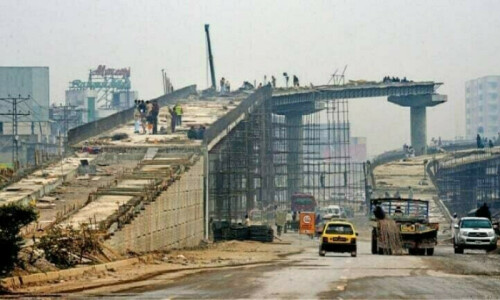SOME large political events have been organised recently at Karachi’s Bagh-i-Quaid, but the ‘women’s rally’ staged by the MQM on Sunday is noteworthy. First, the size of the gathering testifies to the party’s organisational and communications capacity. More striking, however, is the fact that the crowd of tens of thousands comprised mainly women. While Karachi’s urban character has played a role in this, the fact remains that the country has not seen women in large numbers on the side of progressive causes for a long time. In fact, with a few exceptions, the demands for which women have come out on the streets in recent years have been considered regressive. For example, Karachi recently saw women from a religious party protesting against Valentine’s Day, while the memory of Islamabad’s Jamia Hafsa students laying siege to a library has still not faded.
It is a curious paradox that although women’s profile in politics has become more visible in Pakistan, it seems to be eroding at the grass-roots. Recent years have seen the formulation of crucial pro-women legislation and women have taken their place as equal partners in the power corridors. Political parties need to take matters further in this direction. Admittedly, mobilising women in a society where in some areas even their right to vote is questioned, and where public spaces are far from female-friendly, is not easy. Yet one way of countering such attitudes is to raise the level of women’s political participation, particularly in the post-Zia generation. Progressively inclined women need to remind themselves that their invisibility only provides more space to retrogressive elements. Meanwhile, the MQM must follow through with this display of good intent by awarding to more women, when the opportunity arises, tickets for direct election on general seats. Nothing else would send a stronger message about gender equality.











































Dear visitor, the comments section is undergoing an overhaul and will return soon.